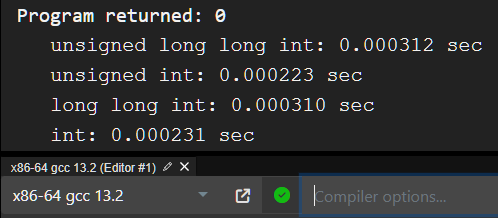Data Type Makes Huge Difference
- Publish Date
Why do data types matter outside of the realm of memory? When I was solving the Special Sequence problem in ZeroJudge, I encountered a weird quirk of zero optimization from the compiler.
Prefix Sum
The problem is simple: find a subsequence whose sum can be divided by and whose starting point and the tail of it are both the lowest. The parent sequence can have up to 100000 elements. Since we are constantly checking the sums of subsequences, we can use a technique called prefix sum. For a sequence , the prefix sum of it is . This means that , which can be used to calculate the sum of a subsequence in constant time. Since we are finding if the sum can be divided by or not, we can check , since we can precalculate the latter and since is of a smaller datatype, theoretically speaking, the latter should downcast the bag of things in front of to 's datatype, which would result in a faster operation. We can write the solution like this:
#include <stdio.h>
// prefix sum (from i = 1)
long long int sum[100001] = {0};
long long int mods[100001];
int solve()
{
size_t n;
int k;
scanf("%zu", &n);
if (!n)
return 0;
for (size_t i = 1; i <= n; i++)
{
int x;
scanf("%d", &x);
sum[i] = sum[i - 1] + x;
}
scanf("%d", &k);
for (size_t i = 0; i <= n; i++)
{
mods[i] = sum[i] % k;
}
// sum[b] - sum[a] = [a+1, b]
for (size_t i = 0; i < n; i++)
{
for (size_t j = i + 1; j <= n; j++)
{
if ((mods[j] - mods[i]) % k == 0) // (sum[j] - sum[i]) % k = (sum[j] % k - sum[i] % k) % k
{
printf("%zu %zu\n", i + 1, j);
return 1;
}
}
}
printf("no solutions.\n");
return 1;
}
int main()
{
while (solve())
;
return 0;
}
However, this resulted in TLE (Time Limit Error), but there is no way to know for sure who the culprit is.
WYSIWYG
What you see is what you get
With the help of Compiler Explorer, I delved into the depth of the assembly behind the scene.
Since ZeroJudge does not optimize your code at all, I left the compiler options empty. Turned out,
(mods[j] - mods[i]) % k was kept as-is with no modification. This resulted in an idiv operation of a QWORD, which
would take longer than one with a DWORD. Thus, I swapped the original code with this:
-long long int mods[100001];
+int mods[100001];
Now, it used idiv with DWORD, which was very nice!
Profiling
To further confirm my conjecture, I decided to profile them with the following code, with every test being 100000 modulo operations.
#include <stdio.h>
#include <stdlib.h>
#include <time.h>
#define MAX_TESTS 100
#define MAX_UNITS 100000
#define GET_TIME(x, dt) \
{ \
clock_t begin, end; \
begin = clock(); \
x; \
end = clock(); \
dt = (double)(end - begin) / CLOCKS_PER_SEC; \
}
long long int buffer[MAX_UNITS];
int main()
{
srand(time(NULL));
for (size_t i = 0; i < MAX_UNITS; i++)
{
buffer[i] = (long long int)(((float)rand() / (float)RAND_MAX) * 10000.0f);
}
int k = 57;
double sm = 0;
int a = 0;
for (unsigned int iter = 0; iter < MAX_TESTS; iter++)
{
double dt;
GET_TIME(
for (size_t i = 0; i < MAX_UNITS; i++) {
if ((unsigned long long int)buffer[i] % k == 0)
{
++a;
}
},
dt)
sm += dt;
}
double avg = sm / (double)MAX_TESTS;
printf("unsigned long long int: %f sec\n", avg);
sm = 0.0;
for (unsigned int iter = 0; iter < MAX_TESTS; iter++)
{
double dt;
GET_TIME(
for (size_t i = 0; i < MAX_UNITS; i++) {
if ((unsigned int)buffer[i] % k == 0)
{
++a;
}
},
dt)
sm += dt;
}
avg = sm / (double)MAX_TESTS;
printf("unsigned int: %f sec\n", avg);
sm = 0.0;
for (unsigned int iter = 0; iter < MAX_TESTS; iter++)
{
double dt;
GET_TIME(
for (size_t i = 0; i < MAX_UNITS; i++) {
if ((long long int)buffer[i] % k == 0)
{
++a;
}
},
dt)
sm += dt;
}
avg = sm / (double)MAX_TESTS;
printf("long long int: %f sec\n", avg);
sm = 0.0;
for (unsigned int iter = 0; iter < MAX_TESTS; iter++)
{
double dt;
GET_TIME(
for (size_t i = 0; i < MAX_UNITS; i++) {
if ((int)buffer[i] % k == 0)
{
++a;
}
},
dt)
sm += dt;
}
avg = sm / (double)MAX_TESTS;
printf("int: %f sec\n", avg);
sm = 0.0;
return 0;
}

I was right. They did take different time to complete under no optimization. If we take this into account, the worst duration for the program is seconds where is the time taken in the above image for the corresponding datatype. The coefficient of is 49999.5, which is large enough to dictate whether TLE should occur or not.
Data Types are Important
When you are using a low-level programming language, always watch out for data types, as they can accumulate significant performance hurdles if you are developing a performance-intense application.